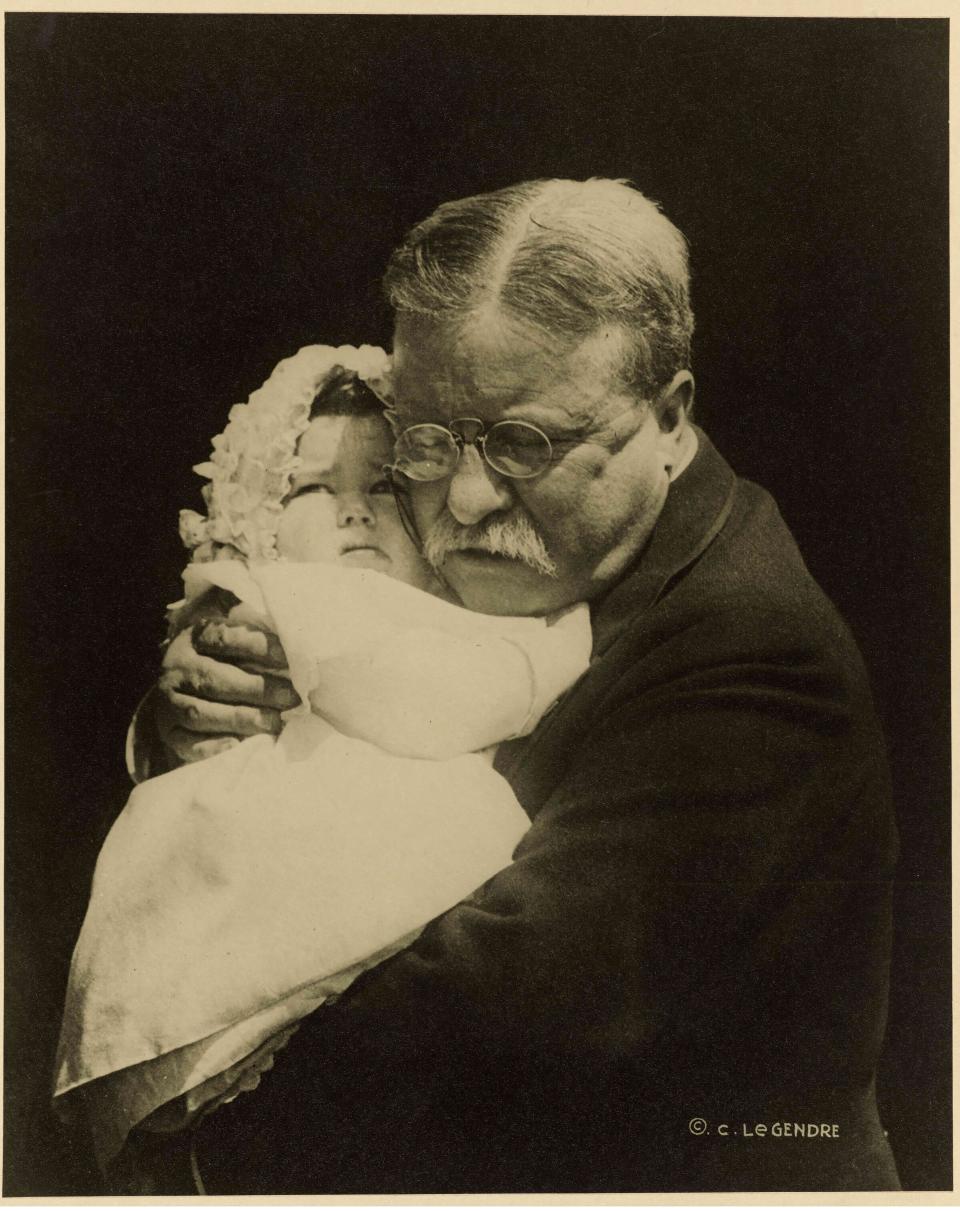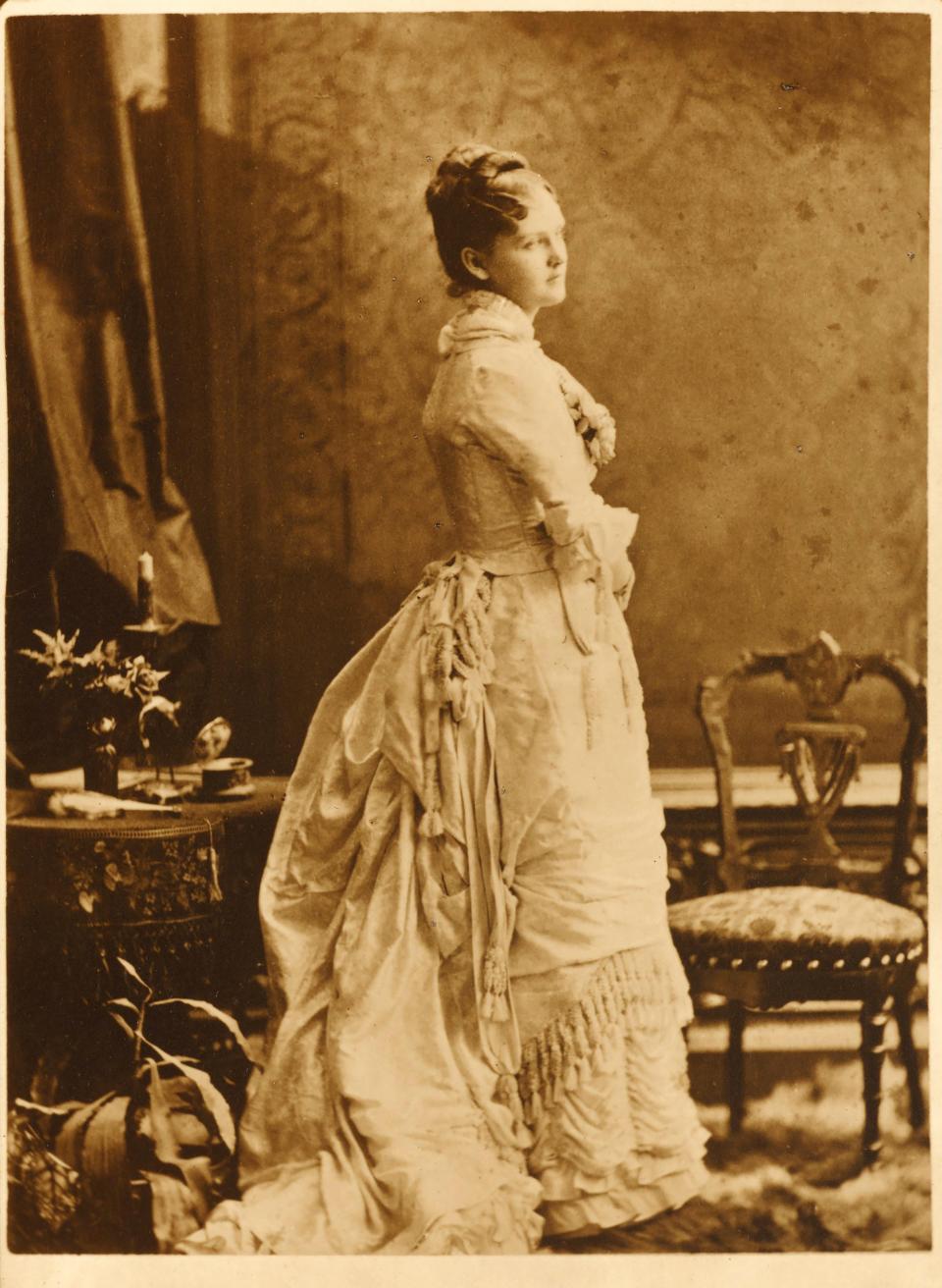The Surprising Feminist Life of President Theodore Roosevelt

Theodore Roosevelt Collection Photographs, Harvard College Library
“There can be no question that women should have equal rights with men.” So began Theodore Roosevelt’s 1880 Harvard senior thesis, “Practicability of Giving Men and Women Equal Rights.”
The man who would become the 26th President of the United States fearlessly led the charge of the Rough Riders, won the Nobel Peace Prize, and saved the game of football. He was shot by a would-be assassin and continued with his speech. But the courage and passion he later showed for daring feats and presidential firsts arguably began with a full-throated endorsement of women’s rights when he was still an undergraduate.
“In the very large class of work which is purely mental … it is doubtful if women are inferior to men … individually many women are superior to the general run of men,” Roosevelt wrote forty years before passage of the 19th Amendment in the United States. Roosevelt continued:
“I contend that, even as the world is now, it is not only feasible but advisable to make women equal before the law … especially as regards the laws relating to marriage there should be the most absolute equality preserved between the two sexes. I do not think the woman should assume the man’s name. The man should have no more right over the person or property of his wife than she has over the person or property of her husband … I would have the word “obey” used no more by the wife than by the husband.”
Roosevelt liked and listened to women in an age when women’s pathways to power were narrow if non-existent.
This was a revolutionary thought for someone of Roosevelt’s class and gender. Roosevelt, long before it was politically popular, supported equal pay for equal work, women owning property, and women’s right to work as judges, lawyers, and doctors.
This lesser known and unexplored side of arguably America’s most masculine president (with all due respect to the heroics of our war presidents such Washington, Grant, or Ike, JFK’s good looks, or Reagan’s well-cultivated cowboy image) is the subject of my book, The Loves of Theodore Roosevelt: The Women Who Created a President.
Roosevelt was raised in a house of strong women. His mother, Mittie, much maligned in history as the stereotypical Victorian taking to the fainting couch, was in truth the source of her son’s acerbic wit, impulsivity, and lively personality. Mittie’s mother and sister lived with the family during the Civil War, and Roosevelt’s two sisters, Bamie and Conie, rounded out the female contingent of the happy home.
TR—as he was known to his peers—called his elder sister Bamie a “feminine Atlas”, and she proved to be one of his most valuable political advisors. Like Robert F. Kennedy to his brother John F. Kennedy, or Valerie Biden Owens to the current President, the bond of siblings transcended politics. Of Bamie it was remarked, “I always believed that if she had been a man, she, rather than [Theodore Roosevelt] would have been President.” In a 1955 interview, several decades after the deaths of both Theodore and Bamie, none other than Eleanor Roosevelt agreed with that assessment: “Well, I think it might easily have been so.”

Theodore’s younger sister Conie was his confidante and emotional outlet. She was also one of his biggest boosters, slipping stories to the press about her brother’s White House antics and adventures. Conie knew the stories about the first family’s wrestling matches and menagerie of wild creatures – from Josiah the Badger (“he bites legs sometimes, but he never bites faces”) to Algonquin the pony (who once took an elevator ride to the second floor of the White House) – would endear the first family to the public. It worked, and President Roosevelt counted a retinue of women activists among his fans.
Roosevelt liked and listened to women in an age when women’s pathways to power were narrow if non-existent. It is clear from the evidence of Roosevelt’s interactions with women, especially his two wives, two sisters, and mother, that the self-made man is a myth. Roosevelt had, in modern parlance, a support system, one that would care for and cajole, comfort and indulge, advise and listen, inspire and encourage him his entire life. His family, especially these incredible women, informed his career path and his values. When he made mistakes, they were there to mitigate the damage and when he triumphed, they knew just how to ensure he reaped the full benefit of that success.
Roosevelt’s Progressive Party was the first to allow women to serve as officials in the national campaign and the first to permit women delegates to the convention.
“I do delight in him,” Edith Wharton, the first woman to earn a Pulitzer Prize for fiction, said of Roosevelt. Wharton recalled that being in the presence of TR “glow in me like a tiny morsel of radium.” The author of such classics as The Age of Innocence and The House of Mirth was a frequent correspondent with the President.
“We owe Mrs. Wharton all the assistance we can give,” Roosevelt wrote in the introduction to The Book of the Homeless (1916), whose profits went to refugees of World War I. TR personally contributed $500 – the equivalent of over $10,000 today – to the home for refugees Wharton founded in Paris.
Wharton was not the only woman of the age to correspond with Roosevelt.
Ida B. Wells was born into slavery and, once free, became one of the nation’s leading journalists, advocating for Black rights and against the horrors of lynching.
Roosevelt took a stronger and more public stance against lynching than his presidential predecessors. “Participation in lynching or even viewing its aftermath [is] inherently demoralizing,” Roosevelt said, while supporting states who used their militia to prevent the deplorable act of racist violence.
Famously, Roosevelt was the first president to invite a Black man to dinner at the White House. Black rights advocate and educator Booker T. Washington dined with the President on October 16, 1901, just two days after the thirty-day period of mourning for assassinated President William McKinley had elapsed.
The reaction was immediate and incendiary. An Alabama Congressman said “no great harm would have been done the country” if a bomb had exploded under the dining table. In 1901, breaking bread with a Black man in the White House had lasting political consequences: Roosevelt would never win a single state in the south and, according to historian Dr. Kathleen Dalton, he was “for a while the most unpopular president in the south since the Civil War.”
President Roosevelt also met with Susan B. Anthony and pledged support for what became the Nineteenth Amendment but only after the movement succeeded in attaining the two-thirds supermajority of states required for ratification. When Roosevelt ran again in 1912, this time not as a Republican but on the Progressive Party ticket, he changed his mind.
Roosevelt’s Progressive Party was the first to allow women to serve as officials in the national campaign and the first to permit women delegates to the convention. Social activist Jane Addams, later the first American woman to win the Nobel Peace Prize, seconded TR’s nomination—another first in history—and TR received the first ever electoral vote cast by a woman. “In the future, Henry,” a cartoon of the age captured, “Please do not refer to me as the ‘Missus’: ‘Call me the moosus,’” referring to the mascot of the Progressive Party, the Bull Moose.
Roosevelt campaigned across the nation and, in the nine states that now legally allowed it, urged women to register and exercise their right to vote. In Spokane, Washington, speaking to an all-women audience, he explained his support for suffrage: “I believe that it will tend toward an increasing number of ideal homes, an increase in the sense of co-partnership between the man and the woman, and make each think more of the rights of the other than of his or her own rights. Just as a man can do better work for others if he is a free man, so a woman can do better work for others if she is a free woman.”
Roosevelt thundered his speech to a close with a challenge: “The suffrage having been given to you it is not only your right but your duty to exercise it. You are false to your duty as citizens and women if you fail to register and vote.”
As the 2,500-person crowd dispersed, “several hundred women were seen standing in the registration line a block away from the theater.”
Roosevelt’s encouraging words in 1912 harkened back to his effusive defense of equality as a college senior in 1880. Roosevelt graduated from Harvard College magna cum laude. He was twenty-first in a class of 177. Yet to his closest college friend he acknowledged what he viewed as his greatest success: his “eager, restless, passionate pursuit of one all-absorbing object” – Alice Hathaway Lee.

Alice Hathaway Lee, athletic and beguiling, was strikingly beautiful with wide, pale blue-gray eyes and dark golden blonde hair. So radiant, her nickname was Sunshine and, in the words of historian E.M. Halliday, her grace equaled her “lively intellect and advanced opinions.”
Halliday surmises the views in TR’s senior thesis “were largely the result of long conversations between the lovers.” Teddy, as he was known only to Alice and a small circle of family and close friends, won the love of Alice and they announced their engagement on February 14, 1880, the Valentine’s Day just three months before the publication of his senior thesis.
“I wish for nothing but to have you to love and cherish all the days of my life,” Teddy wrote to Alice shortly after they were married. It was not to be. Tragically, Alice died on February 14, 1884, four years to the day of their engagement. Bereft and depressed, he wished no longer wished to be called Teddy, the sobriquet his ‘Sunshine’ had given him.
After two years of mourning, and despite his best efforts to avoid her, Theodore rediscovered his childhood sweetheart, Edith Kermit Carow. Edith was the opposite of Alice in just about every way. They were secretly engaged and married in London.
Edith, along with his elder sister Bamie, was TR’s most trusted advisor. “Never, when he had his wife’s judgement, did [TR] go wrong or suffer disappointment,” said Mark Sullivan, a prominent journalist of the age. Roosevelt himself later confessed, “Whenever I go against her judgement, I regret it.”
All his life – from Edith Wharton to Jane Addams, his sisters, and his wives -- Theodore Roosevelt invited the advice and counsel of women. Inspired by his first wife and guided by his second, he lived up to the words he wrote in the heady and hopeful days of college. His life is known for masculine adventures, but the true story of Theodore Roosevelt is incomplete without understanding the outsize role women played. And the women in his life prove no person is self-made, perhaps especially the great ones.
Edward F. O’Keefe is the CEO of the Theodore Roosevelt Presidential Library scheduled to open in Medora, North Dakota, on July 4, 2026, and the author of The Loves of Theodore Roosevelt: The Women Who Created a President (Simon & Schuster) available on May 7, 2024.
Originally Appeared on Glamour

